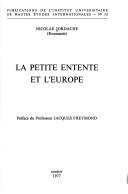| Listing 1 - 10 of 10 |
Sort by
|
Book
Year: 1923 Publisher: Paris : Bossard,
Abstract | Keywords | Export | Availability | Bookmark
 Loading...
Loading...Choose an application
- Reference Manager
- EndNote
- RefWorks (Direct export to RefWorks)

ISBN: 2828800016 9782828800017 Year: 1977 Publisher: Genève: Institut universitaire de hautes études internationales,
Abstract | Keywords | Export | Availability | Bookmark
 Loading...
Loading...Choose an application
- Reference Manager
- EndNote
- RefWorks (Direct export to RefWorks)
Book
Year: 1969 Publisher: Titovo Užice : Tucović,
Abstract | Keywords | Export | Availability | Bookmark
 Loading...
Loading...Choose an application
- Reference Manager
- EndNote
- RefWorks (Direct export to RefWorks)
Little Entente --- Europe, Central --- Politics and government.
Book
Year: 1939 Publisher: Paris : Recueil Sirey,
Abstract | Keywords | Export | Availability | Bookmark
 Loading...
Loading...Choose an application
- Reference Manager
- EndNote
- RefWorks (Direct export to RefWorks)
Little Entente --- Europe, Central --- Politics and government.
Book
Year: 1978 Publisher: București : Editura Academiei Republicii Socialiste România,
Abstract | Keywords | Export | Availability | Bookmark
 Loading...
Loading...Choose an application
- Reference Manager
- EndNote
- RefWorks (Direct export to RefWorks)
Balkan Entente, 1934-1941. --- Little Entente --- Europe --- Politics and government
Book
Year: 1931 Publisher: Hellerau (Dresden) Avalun-Verlag,
Abstract | Keywords | Export | Availability | Bookmark
 Loading...
Loading...Choose an application
- Reference Manager
- EndNote
- RefWorks (Direct export to RefWorks)
Little Entente --- Austria --- Europe --- History --- Politics and government
Book
Abstract | Keywords | Export | Availability | Bookmark
 Loading...
Loading...Choose an application
- Reference Manager
- EndNote
- RefWorks (Direct export to RefWorks)
Balkan Peninsula --- Europe --- Little Entente, 1920-1939. --- Politics. --- Politics --- Petrovitch, Woislav M., --- Ujedinjenje ili smrt.

ISBN: 9732705582 9789732705582 Year: 1997 Publisher: Bucuresti Academiei Române
Abstract | Keywords | Export | Availability | Bookmark
 Loading...
Loading...Choose an application
- Reference Manager
- EndNote
- RefWorks (Direct export to RefWorks)
Book
ISBN: 1474250114 1474250092 9781474250108 1474250106 9781474250115 9781474250092 9781474250085 1474250084 Year: 2017 Publisher: London ; New York : Bloomsbury Academic, an imprint of Bloomsbury Publishing Plc,
Abstract | Keywords | Export | Availability | Bookmark
 Loading...
Loading...Choose an application
- Reference Manager
- EndNote
- RefWorks (Direct export to RefWorks)
"The British Foreign Office's attitude towards the alliance known as the Little Entente, comprised of Czechoslovakia, Yugoslavia and Romania, is the primary focus of this study, though its attitude towards Hungary and Austria is also explored to a lesser extent. Danubian Europe presented constant and serious security risks for European peace and stability and, for that reason, contrary to conventional wisdom, it commanded the attention of British diplomacy with a view to appeasing local conflicts. Britain and Interwar Danubian Europe examines the manner in which the Foreign Office perceived and treated the antagonism between the Little Entente and Hungary, on the one hand, and the impact that the former had in connection with Franco-Italian rivalry in Central/South-Eastern Europe, on the other. With Hitler's accession to power the Little Entente was viewed in Whitehall in relation to its place in the prospective policy for preserving Austrian independence and containing German aggression in the region. Dragan Bakic argues that the British approach to security problems in Danubian Europe had certain permanent features which stemmed from the general British outlook on the new successor states--the members of the Little Entente--founded on the ruins of the Habsburg monarchy. This book shows that it was the lack of confidence in their stability and permanence, as well as the misperceptions about the motives and intentions of the policies pursued by other powers towards Central/South-Eastern Europe, which accounted for the apparent sluggishness and ineffectiveness of the Foreign Office's dealings with security challenges. Based on extensive, original archival research, this is a fascinating volume for any historian keen to know more about the 20th-century history of East-Central Europe or British foreign policy in the interwar years"--
National security --- History --- Great Britain. --- Little Entente --- Danube River Region --- Europe --- Great Britain --- Foreign relations --- Politics and government
Book
ISBN: 0691052344 1322883769 0691617007 0691644187 1400871158 0691100403 Year: 1976 Publisher: Princeton (N.J.): Princeton university press
Abstract | Keywords | Export | Availability | Bookmark
 Loading...
Loading...Choose an application
- Reference Manager
- EndNote
- RefWorks (Direct export to RefWorks)
For about eight months in 1968 Czechoslovakia underwent rapid and radical changes that were unparalleled in the history of communist reform; in the eight months that followed, those changes were dramatically reversed. H. Gordon Skilling provides a comprehensive analysis of the events of 1968, assessing their significance both for Czechoslovakia and for communism generally. The author's account is based on all available written sources, including unpublished Communist Party documents and interviews conducted in Czechoslovakia in 1967, 1968, and 1969. He examines the historical background, the main reforms and political forces of 1968, international reactions, the Soviet intervention, and the experiment's collapse, concluding with his reasons for regarding the events of the Prague spring as a movement of revolutionary proportions.The author's account is based on all available written sources, including unpublished Communist Party documents and interviews conducted in Czechoslovakia in 1967, 1968, 1969. He examines the historical background, the main reforms and political forces on 1968, international reactions, the Soviet intervention, and the experiment's collapse, concluding with his reasons for regarding the events of the Prague spring as a movement of revolutionary proportions.Originally published in 1976.The Princeton Legacy Library uses the latest print-on-demand technology to again make available previously out-of-print books from the distinguished backlist of Princeton University Press. These editions preserve the original texts of these important books while presenting them in durable paperback and hardcover editions. The goal of the Princeton Legacy Library is to vastly increase access to the rich scholarly heritage found in the thousands of books published by Princeton University Press since its founding in 1905.
-Czechoslovakia --- Czechoslovakia --- History --- Politics and government --- HISTORY / Russia & the Former Soviet Union. --- Absolute war. --- Activism. --- Aleksandr Solzhenitsyn. --- Alexander Dubcek. --- Anti-Party Group. --- Anti-bureaucratic revolution. --- Anti-communism. --- Anti-imperialism. --- Bourgeois nationalism. --- Bratislava. --- Brezhnev Doctrine. --- Censorship. --- Censure. --- Central Committee. --- Chronicle of Current Events. --- Comecon. --- Communist International. --- Communist Party of Slovakia. --- Controversial discussions. --- Counter-revolutionary. --- Criticism. --- Czechoslovakia. --- Czechs. --- Days of May. --- De-Stalinization. --- Dean Rusk. --- Demagogue. --- Democratization. --- Diktat. --- Economic democracy. --- Ernest Gellner. --- Ferdinand Peroutka. --- Flexible response. --- Foreign policy. --- German occupation of Czechoslovakia. --- Hungarian Revolution of 1956. --- Imperialism. --- Imre Nagy. --- János Kádár. --- Khrushchevism. --- Little Entente. --- Market socialism. --- Marxism–Leninism. --- Mehmet Shehu. --- Military occupation. --- Motion of no confidence. --- Nationality. --- Nazi propaganda. --- New Course. --- New Departure (Democrats). --- New Economic Policy. --- New class. --- Nonviolent revolution. --- Original position. --- Ostpolitik. --- Peaceful coexistence. --- Police action. --- Political party. --- Politics. --- Popular sovereignty. --- Prague Spring. --- Presidium. --- Proletarian internationalism. --- Protectionism. --- Public diplomacy. --- Quiet Revolution. --- Reformism. --- Reprisal. --- Revisionism (Marxism). --- Revival Process. --- Revolution. --- Robert C. Tucker. --- Samizdat. --- Slovak National Council. --- Slovakia. --- Slovaks. --- Socialism with a human face. --- Socialist Unity Party of Germany. --- Socialist state. --- Sovereignty. --- Soviet Empire. --- Soviet Union. --- Stalinism. --- Statute. --- Subversion. --- Superiority (short story). --- Svazarm. --- Svoboda (political party). --- That Justice Be Done. --- The Future of Socialism. --- The Two Thousand Words. --- Titoism. --- Untouchability. --- Veto. --- Václav Havel. --- War. --- Warsaw Pact. --- West Germany. --- World Trade Organization. --- Yevgeny Yevtushenko.
| Listing 1 - 10 of 10 |
Sort by
|

 Search
Search Feedback
Feedback About UniCat
About UniCat  Help
Help News
News